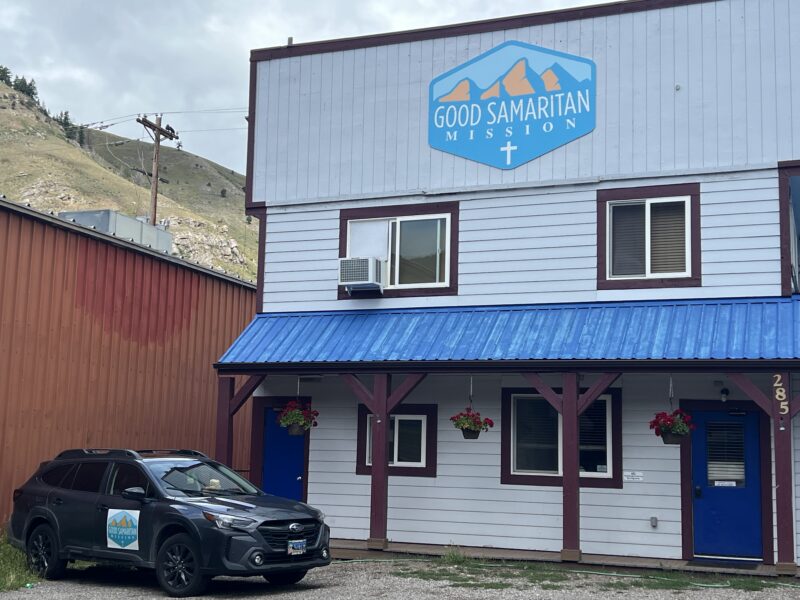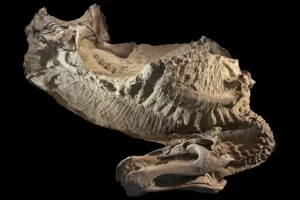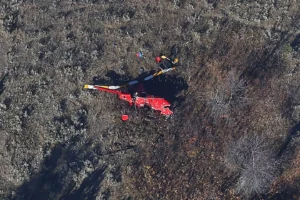Community Leader Calls for Inpatient Treatment Center in Jackson Hole
Need highlighted by the case of a resident in and out of jail
- Published In: Other News & Features
- Last Updated: Aug 09, 2023

The Good Samaritan Mission is a Christ-based homeless shelter in Jackson that also offers food, Bible study, counsel and online courses. (Wyoming Truth photo by Alec Klein)
By Alec Klein
Special to the Wyoming Truth
JACKSON, Wyo.—Throngs of tourists give life to Jackson Hole, buying up bundles of T-shirts, chattering over gourmet burgers, snapping pictures of the iconic elk antler archway at the grassy heart of this famed resort mecca.
And yet, around the corner and down a few blocks in the richest place in the United States quietly sits a jarring juxtaposition to all that fabulous wealth and consumption: the Good Samaritan Mission.
It’s a Christ-based homeless shelter painted in hues of red, white and blue. It’s also a place where Jeremiah Sinarski, among many others, frequently found shelter over the years when he had nowhere else to go. It’s a place for those in need not just of shelter; the mission also offers food, Bible study, counsel and online courses. But for Sinarski, it wasn’t enough. The demons of alcohol addiction would clutch at him, and he’d wander out in search of a drink.
Or more.
And that’s when he’d start screaming and threatening staffers of the mission, and they said it was that behavior that eventually got him permanently banned from the shelter.
More recently, Sinarski, 47, has come upon a different place to call home from time to time: the Teton County Jail. And his troubling case, often involving alcohol, throws into stark relief a problem for the state’s no. 1 resort attraction: There is no inpatient drug and alcohol treatment center in Jackson, and there’s a need for it, said Pastor Chuck Fidroeff, executive director of the nonprofit Good Samaritan Mission, in an interview yesterday.

Part of the problem, Fidroeff said, is what’s known as “NIMBY”—not in my backyard; residents worry that such a rehab center would draw undesirable people to their neighborhoods and drive down their property values.
“I don’t think they see a need for it,” he said. “It’s the same thing in every town.”
Fidroeff does see a need for an inpatient rehab program—to help people “get clean, sober and focused, better able to work and be a productive citizen.” Without such a rehab center, he said, “There’s no chance to move forward.”
As it is, people with alcohol or drug addictions must look elsewhere, to facilities in places like Riverton, or Casper for inpatient treatment.
“Can’t do it here,” he said.
For all the natural beauty that draws people far and wide to experience the majestic snow-capped Teton Range and other awe-inspiring environs, the county boasts a higher percentage of adults reporting binge or excessive drinking than that of the state or nation, according to a countrywide report issued by the University of Wisconsin Population Health Institute earlier this year.
Over 20%—about one in five people in Teton County, home to the city of Jackson—reported excessive drinking. What’s more, 18% of motor vehicle crash deaths in Teton County involved alcohol. Dozens of people have perished over the past several years, records show.
Meanwhile, driving while under the influence is one of the most common crimes in Teton County, according to a yearlong data analysis by the Wyoming Truth last year. “I think by far the most dangerous thing that happens in Teton County on a daily basis is driving under the influence,” said Dick Stout, a criminal defense attorney with the DeFazio Law Office in Jackson.
As a result, an inpatient rehab center could make a significant difference, said Katie Mannen, a criminal defense attorney with the firm Mannen Browne LLC in Jackson. “There’s a huge need for that,” she said yesterday.
The Teton County board of commissioners have acknowledged the problem with alcohol. For instance, in an agenda report of July 2021, it noted several areas of concerns for funding priorities, including “underage alcohol use” and “adult binge drinking” prevention.
Is alcohol abuse a toll of the burden of so much wealth concentration in Jackson Hole, or the cost of not having enough of it? Does it have to do with Wyoming’s cowboy culture of rugged western individualism? Part of the problem, said Fidroeff, is, “It’s a party town.”
This much is clear: Inpatient rehab centers began to emerge throughout the United States in the 1960s and 1970s, notably through the work of Dr. Mitchell S. Rosenthal and Phoenix House rehab centers that spread throughout the country. But the movement never arrived in Jackson Hole.
There is a detoxification center at nearby St. John’s Hospital—though stays are often limited to a few days. But that there isn’t an inpatient rehab center here flies in the face of the region’s prodigious wealth and capacity to make it happen.
The average per-capita income in the county reached over $318,000 in 2021—far more than any other county in the United States—according to a report last year. That was well over $100,000 more than the county that came in second place, Pitkin County, Colorado—otherwise known for its tony town of Aspen.
By another measure—IRS records—Teton County came in first place with the highest concentration of wealth per household in the United States at over $312,000 in adjusted gross income—before taxes and charitable contributions—according to a report last year. In second place was New York County with over $212,000.
Throw in this number, too: The median home price in Teton County stands in excess of $3.6 million.
For Sinarski, his idea of a home was far more modest, often coming in the form of brief stints at various motels in the area, including the quaint Pony Express Motel less than two miles from the town square.

In late July, as he sat in the county jail, the question was whether he ought to be moved to the state hospital. As Sinarksi filled the jail with screams night and day, a local judge ordered a “fitness to proceed evaluation”— a mental health evaluation required of the criminal justice system. That evaluation was requested on July 19 by Sinarski’s attorney, Elisabeth M. W. Trefonas, the Teton County public defender. Sinarski and his attorney, who is a member of the board of advisors of the Wyoming Truth, could not be reached for comment. Sources said Sinarski has been placed in solitary in the jail, where he remains.
In his most recent arrest, court records show that, on June 5, officers were dispatched to the scene of a car accident. Sinarski was wearing a hooded black coat as he walked away from a damaged tan Oldsmobile. He couldn’t walk in “straight lines.” With “bloodshot watery eyes” and “slurred speech,” he admitted to consuming beer, and he was arrested for driving under the influence of alcohol.
Sinarski was sentenced to 180 days. He was released on June 27 and placed on probation for two years. It took less than two weeks for him to violate probation. On July 6, Sinarski was found at Smith’s Grocery Store just a couple of miles from downtown Jackson, where he was “yelling and cussing and throwing things in the checkout area of the store, causing a disturbance,” according to court records.
Sinarski was also in the act of purchasing a six-pack of beer at about 10 p.m. An officer was dispatched to the scene, and when the officer asked Sinarski what had happened, Sinarski “began yelling about his frustrations with the people of the Jackson Hole community,” according to the probable cause affidavit.
What ails Sinarski isn’t only alcohol abuse and addiction; he has been diagnosed as bipolar and schizophrenic with hallucinations, according to his attorney.
Mental health also is a top concern among the denizens of Jackson Hole. Nearly half of its residents reported that they struggled with their mental health during the pandemic, and about half of them sought help, according to a report last year. COVID-19 wasn’t the only culprit; the high cost of housing and the lack of enough income to get by also contributed to the problem.
Mental health issues are plaguing the jails as well. Because of a perennial shortage of beds at the Wyoming State Hospital, some residents, like Sinarski, have been forced to sit in jail and wait.
Fidroeff, the head of the Good Samaritan Mission, sees other unmet needs in Jackson; he wants the community to open a shelter for families, or women and children. Good Samaritan provides shelter to single men and women.
“That is needed,” he said, bemoaning that he was forced to turn away about a dozen people this summer.
Fidroeff doesn’t want to only rely on donations to help those in need; he wants to open a thrift store to raise funds. Good Samaritan is a donor-funded mission.
Having lived in the community for a dozen years, Fidroeff, now 72 years old, sees so much that could be done to help others: “Been on my heart since I’ve been here.”













